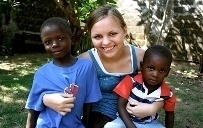
|
|


In 1960, Senator John F. Kennedy challenged the students at the University of Michigan to dedicate two years of their lives to help those in developing countries. Nearly half a century later, the United States Peace Corps has carried on Kennedy's vision of Americans traveling abroad for volunteer service that not only provides locals with technical training but also promotes a cross cultural understanding between Americans and those they serve. More than 195,000 volunteers have answered Kennedy's call with service in 139 countries around the world. Though most volunteers work with public health in some aspect during their service, job descriptions range from information technology and environmental preservation to youth development and education. Applying for the Peace Corps and serving as a volunteer is not a simple process. Volunteers go through a long and rigorous application procedure which includes essays, references, interviews, medical and dental appointments and evaluations, legal screenings and lots of patience. For some people, the time from initial application to the first day of in-country training can be nearly two years. During the application process it is important that potential volunteers honestly evaluate themselves and their ability to serve abroad for 27 months. The brutal truth is that this isn't an extended vacation. Volunteers may live in places with no electricity or running water. They may not know the language and are frequently the first foreigners that many small villages have encountered. Technology may be scarce, physical labor to stay clean and fed can be trying on the nerves, and homesickness is a true reality. When potential volunteers consider applying for Peace Corps service, they need to spend time talking with their recruiters about their concerns as well as their skills and abilities. The more a recruiter knows about a person, the easier it is to make an appropriate match that fits both the volunteer and the community in need of a volunteer's services. For the first three months in country, volunteers live with host families and go through intensive cultural, technical and language training. Once placed at a site, they spend a lot of time getting to know their neighbors and talking to community members. The point of Peace Corps is not to keep a running tally of the number of irrigation systems built or students taught. Rather, volunteers should provide a community with the tools and resources it needs to solve its own problems in a sustainable manner. This may include working with fellow teachers to share lesson plans and teaching strategies or with members of a health clinic to find local solutions to nutrition and healthcare problems. One of the most important things to remember about the Peace Corps is that two of the three goals are involved with cross cultural exchange between volunteers and the people they encounter during service. Those long drawn out lunches or seemingly endless meetings under shaded trees with the local women mean something, even if nothing tangible results from them. In many developing countries, time moves at a much slower pace. Americans who are used to rushing from one task to another may find themselves frustrated and upset by the lack of apparent "progress" taking place. There is a reason why Peace Corps service lasts for two years. Nothing happens overnight, but even volunteers who complete their service with "nothing" to show for it often walk away with a life-changing experience. Upon completion of service, many volunteers find themselves questioning the career path they thought they would follow. Several decide to turn their focus toward international relations or civil service while others choose to work in the non-profit sector. Regardless of their future paths, nearly all Peace Corps volunteers look back on their days of service-both good and bad-and remember them as some of the best days of their lives. After all, volunteering with the U.S. Peace Corps really is the toughest job you'll ever love. |
TM |
Copia Magazine Home --- Contact Us --- Privacy Policy --- Copyright |